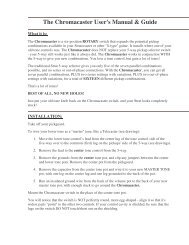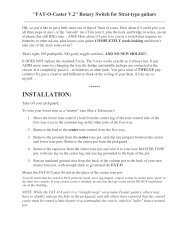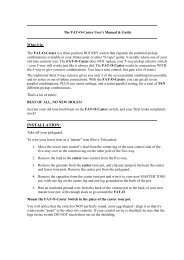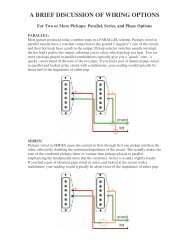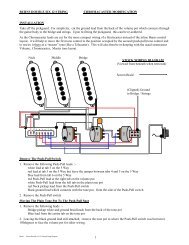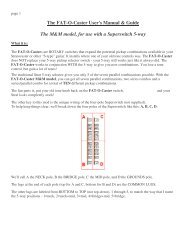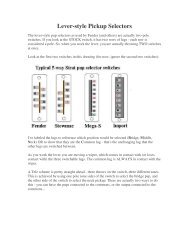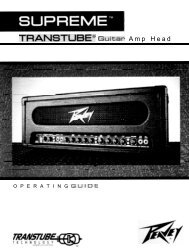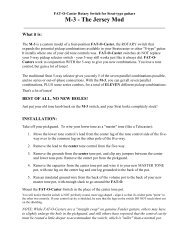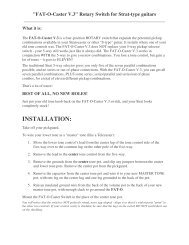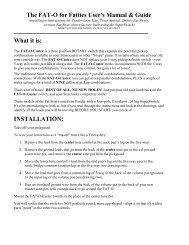What IS Quack, Anyway??? The tone that is generally ... - Deaf Eddie
What IS Quack, Anyway??? The tone that is generally ... - Deaf Eddie
What IS Quack, Anyway??? The tone that is generally ... - Deaf Eddie
You also want an ePaper? Increase the reach of your titles
YUMPU automatically turns print PDFs into web optimized ePapers that Google loves.
<strong>What</strong> <strong>IS</strong> <strong>Quack</strong>, <strong>Anyway</strong>???<br />
<strong>The</strong> <strong>tone</strong> <strong>that</strong> <strong>is</strong> <strong>generally</strong> referred to as "quack" - the classic Strat 5-way throw #2<br />
and #4 spot <strong>tone</strong>s - <strong>is</strong> created by a pair (or more) of pups, parallel IN PHASE - NOT<br />
out of phase. That "out of phase" rap <strong>is</strong> a bit of bad info <strong>that</strong> probably has its roots<br />
somewhere back in the same swamp <strong>that</strong> caused the Strat's vibrato bridge to be called<br />
a "tremelo." Ouch! But, <strong>that</strong>'s what Leo called it, so it stuck. Actually, if two pups are<br />
out of phase, the combined <strong>tone</strong> <strong>is</strong> usually quite thin and nasally - most ears find it<br />
downright unpleasant.<br />
<strong>The</strong>re's an old saying:<br />
“<strong>The</strong> three most important things about a business are location, location, location...”<br />
<strong>The</strong> specific frequency response (<strong>tone</strong>) <strong>that</strong> we have come to call "quack" <strong>is</strong> what<br />
happens to the <strong>tone</strong> when you play two pickups with the same tonal character<strong>is</strong>tics<br />
mounted in CLOSE PROXIMITY to one another. Actually, it's quite similar to what<br />
happens when you play two pickups with one out of phase - not as dramatic,<br />
certainly but it <strong>is</strong> the same principle at work. <strong>The</strong> "quack" happens as frequencies<br />
produced by one pickup are emphasized or cancelled out but the output of the other<br />
pickup, leaving a notchy, quirky <strong>tone</strong>. Change the location of one pickup or the other,<br />
and you change the sound/frequencies <strong>that</strong> pickup produces, and <strong>that</strong> changes which<br />
frequencies are cancelled between the pair - changing the "quack factor."<br />
<strong>The</strong> classic Strat quack <strong>is</strong>, I BELIEVE, caused in equal parts by the fact <strong>that</strong> (A) the<br />
pups are close together and (B) the pups are so similar in frequency response and<br />
output (the combo of all three Strat pups on, in parallel, also <strong>is</strong> a nice quack). If you<br />
unmatch yer Strat pups - <strong>that</strong> <strong>is</strong>, swap ONE pup out for something d<strong>is</strong>-similar - it<br />
will have a d<strong>is</strong>tinct effect on the quack factor. That's why home-built H-S-S Strats<br />
lose some of the sweet quack in throw #4, unless you have a coil-shunt happening<br />
(like the Fender Fat Strats have).<br />
Do other guitars quack? Technically, yes… Three-pup Teles will quack in (2) and<br />
(4) like a Strat, but the quack will have a have a different character, as the<br />
construction and <strong>tone</strong> of the two pups creating the quack are different.<br />
FURTHER!<br />
Two-pup Teles have a subtle "quack" when the pups are played together, but as the<br />
pups are so different and so far apart, we don't perceive it as a classic quack - so, let's<br />
call it a "cluck," a term which I have heard several players use. For Teles, there have<br />
been a few mods drawn up using a capacitor to filter the output of the neck pickup
while playing the pair out of phase in order to modify the cancellation pattern,<br />
attempting to get the two-pup Tele cluck to more closely to replicate the sound of the<br />
Strat quack. It creates an interesting <strong>tone</strong>, but you will have to decide for yourself<br />
how close it comes.<br />
With “cluck” for a new definition of parallel <strong>tone</strong>s, it could be said <strong>that</strong> Gretschs<br />
cluck, too - we've all heard it, and I think the cluck of a pair of Gretsch single-coils<br />
pretty much defines rock-a-billy <strong>tone</strong>.<br />
Gibsons can cluck, too, especially the P90 axes, but on Les Pauls, SG's and the like,<br />
it seems to me <strong>that</strong> the fatness of humbuckers warm the <strong>tone</strong> so much (too much<br />
fundamental, not enough over<strong>tone</strong>s and harmonics) <strong>that</strong> some of the character <strong>is</strong> lost.<br />
You can get some of <strong>that</strong> delicate <strong>tone</strong> back with coil-shunts or coils-parallel custom<br />
wiring options…<br />
So, let us say pickups <strong>that</strong> are "Strat" d<strong>is</strong>tance apart will quack…<br />
And pickups <strong>that</strong> are "Tele" d<strong>is</strong>tance apart will "cluck."<br />
Now, if th<strong>is</strong> <strong>is</strong>n't a great argument for owning a bunch of different guitars,<br />
I don't know what <strong>is</strong>!



